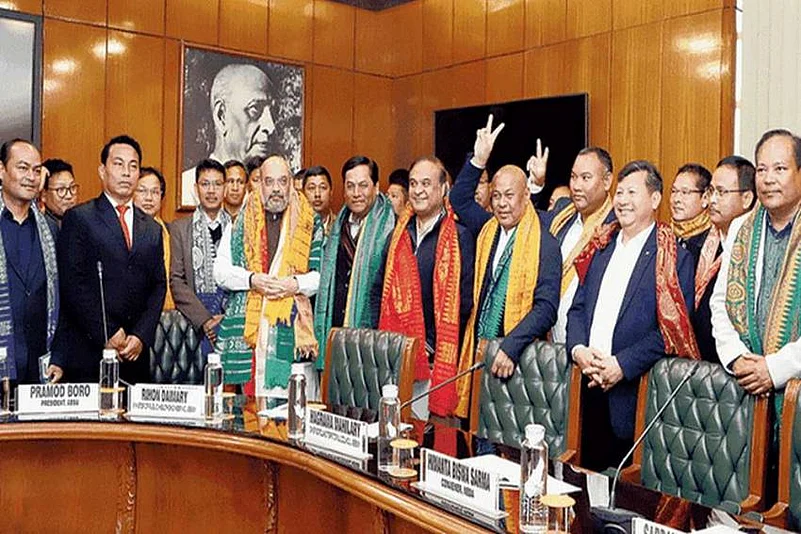Was Prime Minister Narendra Modi too hasty in claiming credit for the “final solution” to the “Bodo” problem on February 7 this year? Was it similar to his claim made on August 3, 2015, on the “end of the Naga problem”? Nothing has moved beyond negotiations regarding the Naga Peace Accord as announced by Governor R.N. Ravi on October 31, 2019.
On January 27, the National Democratic Front of Bodoland (NDFB) and All Bodo Students’ Union signed a peace accord with the Union Home Ministry and Assam Government. The area has been renamed as Bodoland Territorial Region (BTR) and its assembly seats increased from 40 to 60. How is this accord any different from the earlier agreements?
This is the third pact signed between the Bodos and the government. The first was signed on February 23, 1993, with 21 clauses. That was supervised by the then Minister of State for Home, late Rajesh Pilot. It created the “Bodoland Autonomous Council” (BAC). Although the accord gave sufficient autonomy on paper, it failed. The Second was signed on February 10, 2003, during the Vajpayee government which created “Bodoland Territorial Council” (BTC). It had 16 clauses and the main Bodo negotiating group was Bodo Liberation Tigers (BLT). In the current accord, the main group is NDFB. Observers said that the 2003 accord had resulted in great jubilation. How, then, did the PM claim on February 7 that the previous governments were reluctant to “touch it but we did”?
Unfortunately, the fault lines in Bodoland are too deep and cannot be cured by mere public speeches. The Bodos, according to some versions, were the original inhabitants of the Brahmaputra Valley. They were present there much before the Ahoms, the present Assamese, who are believed to be the descendants of the “Tai” people from Burma and moved to the Valley back in 1228 AD. In ancient Sanskrit literature, Bodos were called “Kacharis” or “Kiratas”. Pushya Varman was a Bodo king who founded the Kamarupa kingdom in the 5th Century CE.
The first clash between “Bodos” and “Ahoms” was in 1490 AD which was won by the former. But they were defeated in 1536. By 1747, Bodos were pushed to a small area in Southern Nowgong. The British rule brought them more problems. Sandwiched between the British planters, Ahom merchants and Bengali (mainly Muslims) settlers, the Bodos moved to the North where they faced Nepali migrants. Foundations of Bodo-Ahom enmity on one hand and with Muslims on the other were laid because of these developments. This was accentuated by the British land revenue policy making them landless.
After independence Gopinath Bordolai, the first Chief Minister of Assam, refused to give them “tribal Status” as he wanted them to be “assimilated”. This forced them to be indebted to Hindu and Muslim money lenders. Their loss of identity, indebtedness, unemployment and landlessness were highlighted in a 1989 survey edited by the late Kerala Chief Minister Namboodiripad.
Sanjoy Hazarika, one of the foremost North East experts, had said in 2014 that creation of BAC or BTC did not solve their problem. This is because of the innate contradiction that the newly created Bodo lands have physical majority, estimated as 73%, of non-Bodos such as Muslims, Assamese, Bengali Hindus and tribal groups such as the Adivasis and Koch-Rajbongshis. “However, under the Bodo accord, the levers of political power, including representation in the local council or assembly, access to funds and the force of weapons are with the Bodos”.
To solve this, a very tricky provision was introduced in the 2020 accord on the appointment of a commission to include the Bodo majority areas in the BTR and to exclude non-tribal majority areas from it. From past experience, carving out boundaries in this volatile region and displacement of residents have only resulted in violence with new terrorist groups emerging out of the 220 ethnic groups.
A North East newspaper has said on February 4 that the BJP timed the signing of the 2020 accord as a counterpoise to the growing anti-BJP and anti-NRC-CAA feelings in Assam, which had compelled the PM to postpone his visit to the Assamese areas. This is a dangerous game in the background of intense feelings between the Assamese and Bodos and their propensity for violence.
(The writer is a former Special Secretary, Cabinet Secretariat. Views expressed are personal.)



















.jpg?w=200&auto=format%2Ccompress&fit=max)






